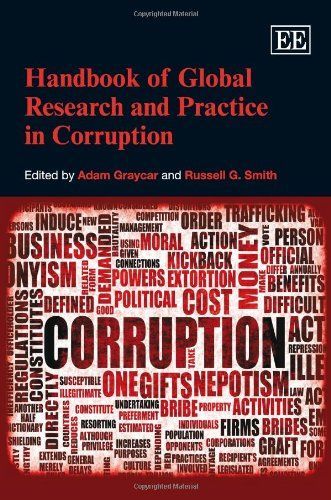
Handbook of Global Research and Practice in Corruption
'Graycar and Smith's excellent edited volume studies corruption as a pervasive, global phenomenon. The chapters move from general overviews to in-depth studies of corruption-prone sectors such as forestry, financial markets, public procurement, and trade in diamonds and art. The volume is an important, contribution to the international study of corruption that mixes scholarly analysis with practical recommendations for the control and prevention of corruption – both international initiatives and country – or sector-specific policies.' – Susan Rose-Ackerman, Yale Law School, US 'Corruption is on top of the agendas of practitioners and scholars in public administration all over the world. This volume addresses questions no one can neglect and comes up with answers we should not miss.' – Leo Huberts, VU University Amsterdam, The Netherlands 'This Handbook will serve as an invaluable resource for scholars, students and public officials interested in understanding corruption and its control.' – James B. Jacobs, NYU School of Law, US Corruption is a global phenomenon with costs estimated to be in the trillions of dollars. This source of original research and policy analysis deals with the most important concepts and empirical evidence in foreign corrupt practices globally. Handbook of Global Research and Practice in Corruption includes research from all continents and provides a critical analysis of the key issues of corruption and its control. Through rigorous analysis and theoretical foundations, this book provides a multi-disciplinary and international account of corruption from the perspectives of public policy, criminal law and criminology, as well as considering principles of prevention and control in both the public and private sectors. With original and empirical analyses, this unique book will appeal to academics, researchers and students in international business and international law, staff of crime and corruption commissions and police integrity agencies, as well as international organisations such as the World Bank, IMF, Transparency International and the World Economic Forum.